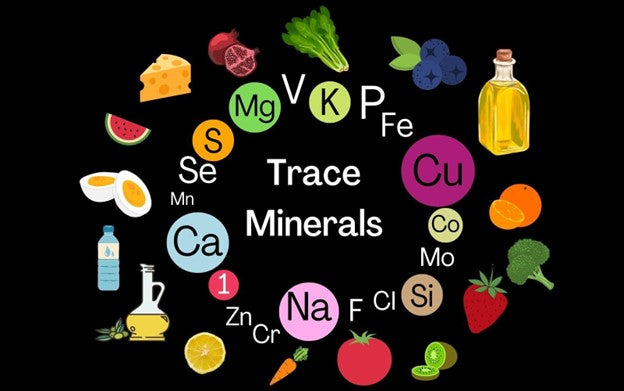When was the last time you thought about your trace mineral intake?
Let’s face it, most of us have bigger things to worry about. Even the most dietary-conscious among us tend only to prioritise their 5-a-day (or should that be 10-a-day?).
Trace minerals are all too often overlooked, which is a great shame given the valuable contribution they make to our physical health. Inorganic substances required by the body for a slew of biological functions, trace minerals – also known as trace elements – are needed in much smaller amounts than vitamins and minerals, which is probably why they get less attention.
Another reason is because they’re found in countless food groups, from meat and milk to cereals, vegetables and nuts. Generally speaking, we don’t have to go looking for trace minerals.
In this article, we'll take a closer look at dietary trace minerals. What are their functions and benefits and how can we ensure we’re getting enough?
The Difference Between Macrominerals and Trace Minerals
There are several minerals you are bound to be aware of.
For the most part, these are the macrominerals – those which are required in adults in amounts greater than 100 mg/day.
Trace minerals, on the other hand, are required in amounts that vary between 1-100mg per day.
Macrominerals include:
• calcium (the most abundant mineral in the human body)
• phosphorus
• magnesium
• sodium
• potassium
• chloride
• sulfur
While trace minerals comprise:
• iron
• manganese
• copper
• iodine
• zinc
• cobalt
• fluoride
• selenium
Although macrominerals are perceived as being more important, the fact is that deficiencies of trace minerals – particularly iron, copper, iodine and zinc – can have a detrimental effect on health.
Clinical manifestations of copper deficiency, for example, can include anemia and myeloneuropathy (a disorder affecting the spinal cord and peripheral nerves).
Iodine deficiency, meanwhile, can cause brain damage, hypothyroidism and goiter.
Trace minerals have countless benefits, variously helping to manufacture hormones, regulate your metabolism, fortify the immune system, strengthen bones and teeth, improve neurological function, and even create blood cells.
For the most part, eating a wholesome and varied diet will ensure a steady stream of both macrominerals and trace elements. However, it should be noted that intensive modern farming methods deplete nutrients and minerals in soil.
Moreover, in a 2019 research paper published in the journal Nutrients, the authors noted that “Trace mineral deficiencies (except for iodine, iron, and zinc) do not often develop spontaneously in adults on ordinary diets; infants are more vulnerable because their growth is rapid and intake varies.”
Common Trace Mineral Deficiencies
So, why did the researchers single out iodine, iron and zinc as being the nutrients most associated with deficiency?
Simply put, these require a more proactive dietary approach.
Iodine, for example, is found mainly in seafood and cow’s milk. If you don’t eat fish or drink milk, it’s very likely that you’re iodine-deficient. This should be a concern, because the thyroid gland depends on iodine to manufacture thyroid hormones, which help regulate growth, fix damaged cells and engender a healthy metabolism.
Iodine is also vital for heavy metal excretion, healthy skin, the metabolism, and nervous system functioning. Interestingly, studies also highlight a correlation between iodine intake and IQ level. Sadly, Britain is one of the top ten most iodine-deficient countries in the world.
Iron is derived mostly from meat, fish and beans, meaning vegans are once again at the highest risk of a deficiency. A high intake of caffeine can also negatively influence iron absorption. Without sufficient iron, the body manufactures fewer red blood cells leading to an increased risk of iron deficiency anemia.
According to the WHO, iron deficiency is the single most common nutritional disorder in the world, with approximately 20% of females, 50% of pregnant women, and 3% of adult men suffering from a dietary shortfall.
The final trace element at which people might be at a higher risk of deficiency is zinc. Can you guess which foods contain zinc? You got it: meat and seafood.
In this case though, vegans have more opportunities to raise their levels, since zinc is also found in wild rice, seeds, cashews, peas and almonds.
Zinc is the most abundant trace element in our cells and possesses appreciable antioxidant and anti-inflammatory properties, playing a role in the activity of over 300 biological enzymes. It’s needed for immune health, bone formation, and even our sense of taste and smell.
Conclusion
Minerals only constitute around five percent of the average human diet, but they are absolutely essential for human health.
The body utilizes both macro- and trace minerals for countless jobs, most particularly related to the cardiovascular, skeletal and nervous systems. Although we only need small amounts of trace minerals, deficiencies can set the stage for illness.
It’s not just vegans who may experience a shortfall, either: those who suffer from gastrointestinal problems may struggle to absorb minerals and other nutrients. Trace mineral deficits are also common during pregnancy, and some medications can cause malabsorption.
Questions, comments? Don’t hesitate to get in touch.
Water for Health Ltd began trading in 2007 with the goal of positively affecting the lives of many. We still retain that mission because we believe that proper hydration and nutrition can make a massive difference to people’s health and quality of life. Click here to find out more.




























Leave a comment